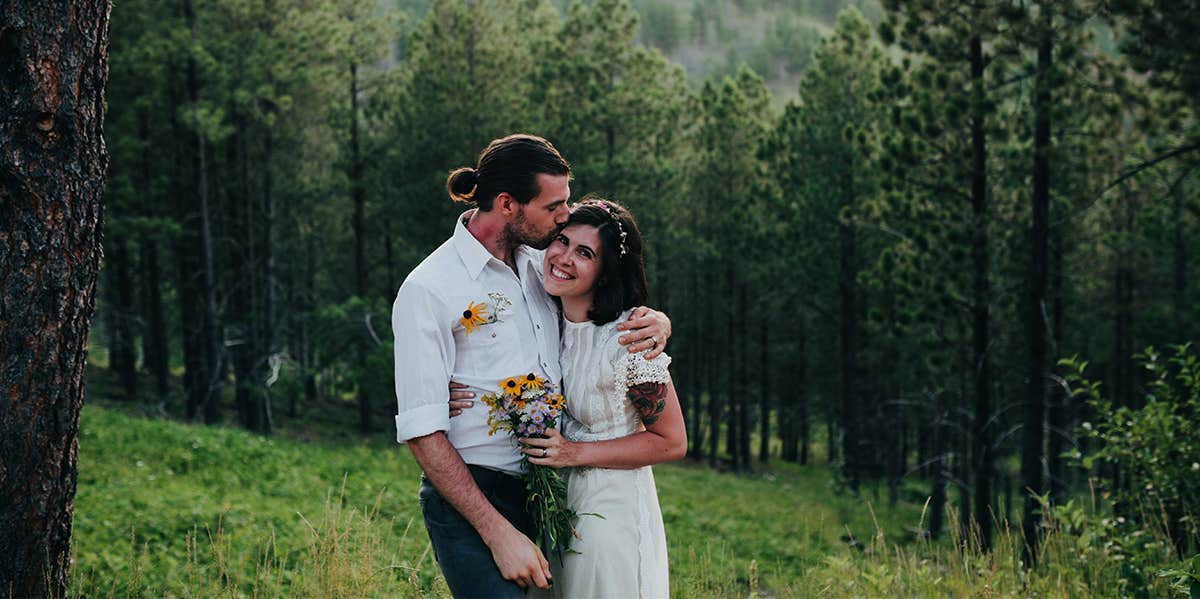Why Couples Who Throw Cheaper Weddings Have Better Marriages, According To Research
Is there a correlation between expensive nuptials and divorce? Maybe so.
 Cavan-Images / Shutterstock
Cavan-Images / Shutterstock As families flock together for the holidays, birthdays, and special gatherings, questions get popped and rings get shown off in cute selfies online. And then it's time to start wedding planning.
If you’re nodding your head, I beg you to consider exactly what the wedding-planning process means for you. More importantly, don’t “sell out” your values. It turns out that money really is a factor — but it maybe not how you think.
When it comes to how much you spend on your wedding, less actually is more in the long term.
Spend less on the nuptials for long-term wedded bliss
It might seem counter-intuitive, but a budget wedding might be the best thing for you in the long run. That's because a 2014 study found that the more couples spent on their big day, the shorter their marriage was likely to last.
For the sample of women, the chance of divorce was 3.5 times greater for couples who spent more than $20K as opposed to those who spent between $5K and $10K. The researchers also stated that their evidence suggests weddings that are high in attendance but relatively inexpensive are associated with lower divorce rates.
In today’s wedding culture, where the “necessities” include destination location bachelor and bachelorette parties, photo booths, videographers, and lavish post-wedding brunches, creating a relatively inexpensive wedding definitely requires you to be creative in your planning.
The creative power of the 'little things'
A few years ago, I exchanged “I do’s” with my husband in the sunroom of my parents’ home. The best part (besides marrying my soulmate, of course) was that we didn’t break the bank.
The DIY touches, such as the wedding cake my mother decorated with flowers in my basement and the lace ribbon I hot-glued to my hand-arranged bouquet two minutes before I walked down the “aisle” (aka the living room) made the day feel genuine, special and utterly real.
Twenty guests witnessed my husband and I make the most serious commitment of our lives. It was intimate and lovely.
Most importantly, I didn’t allow myself to feel inferior for doing things my own way on my wedding day.
I skipped the frivolous expenses I initially felt pressured to include — from the influence of the stunning images on Pinterest that left me drooling, or the fact that I was 28 and everyone around me was getting married with cookie-cutter or boring nuptials, no expenses spared.
Establish your nuptial priorities — and stick with them
With seven wedding invites this year and traditional bridesmaids' duties, I’ve never once regretted my unconventional wedding decision. According to the Knot, an average wedding has 117 guests and costs an average of $256 per guest — a little less than $30,000, in total.
You should question what’s truly important to you without the hoopla created by people outside of your relationship. For the majority of people in their 20s and early 30s, a huge wedding is likely irresponsible. Millennials crave instant gratification — we want things now! We don’t really think through the consequences.
What happened to financial responsibility, like paying off your debt? Hello, enormous school loans. It’s not sexy to be conscious about spending limits during wedding planning, but making wise decisions will provide you and your partner more financial freedom down the road.
If you’re just putting on a big show because it’s what everyone else is doing or if you feel pressure to impress people, I urge you to take a step back and look at the big picture.
This event is made to honor the bond between you and your new husband. Your relationship is what’s most important.
It’s not about providing a lobster dinner for 100 friends and their plus-ones who you don’t even know or like. The people who truly love you will support whatever decision you make, and they won’t take it personally if you don’t throw a big shindig.
Samantha Burns is a licensed counselor, dating coach, and the love guru behind the free worksheet Reframing My Negative Thoughts About Love.
